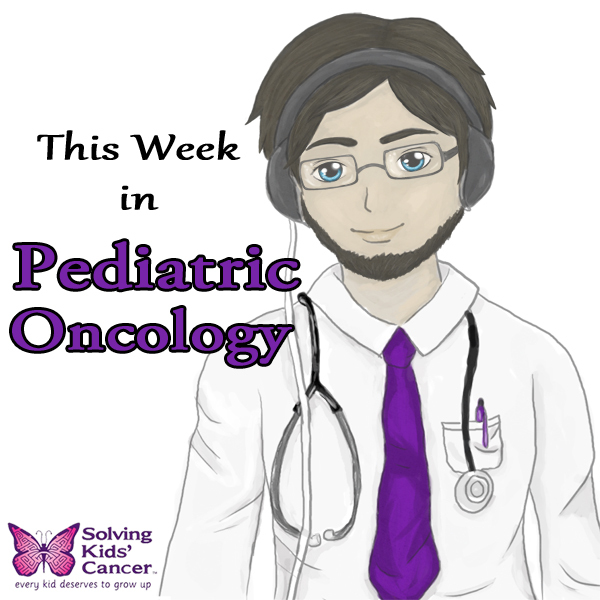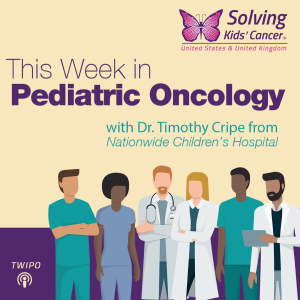This Week in Pediatric Oncology
children
Episodes

Monday Feb 10, 2014
Monday Feb 10, 2014
July
12, 2011
In this eleventh episode of "This Week in
Pediatric Oncology" hosts Dr. Tim Cripe and Dr. Lars Wagner discuss with
guest Dr. Brian Weiss (Cincinnati Children's Hospital) the implications of the
recent results comparing two chemotherapy combinations for transplant regimens in
children with high-risk neuroblastoma in Europe. The BuMel (busulfan,
melphalan) regimen resulted in better survival and lower toxicity than CEM
(carboplatin, etoposide, melphalan), a regimen used for transplant in the COG
for a decade.
This SIOP trial was one of the plenary
presentations at ASCO in June 2011. In this lively and informative discussion,
Dr. Brian Weiss explains the COG response to these results due to the
difference in induction regimens. The BuMel regimen will be used in the
upcoming MIBG frontline pilot that Dr. Weiss is leading as principal
investigator.
Dr. Weiss and TWiPO hosts also discussed the
recent paper Safety and efficacy of tandem (131) I-metaiodobenzylguanidine infusions
in relapsed/refractory neuroblastoma authored by Johnson et
al in Pediatr Blood Cancer. 2011 Apr 14
Please send questions and comments to
twipo@solvingkidscancer.org

Monday Feb 10, 2014
Monday Feb 10, 2014
July
07, 2011
"This Week in Pediatric Oncology"
podcast host Dr. Tim Cripe interviewed Dr. Robert Seeger from CHLA (Children's
Hospital of Los Angeles) about his contributions to improvements in treating
neuroblastoma as well as his vision for future advances.
Dr. Seeger's career has been remarkable in that
he began with an interest in immunotherapy and neuroblastoma as an intriguing
model for this approach, and has consequently been involved in every major
advance in treating neuroblastoma, including the pivotal 1984 discovery of
the first-everamplification of an oncogene for any cancer – MYCN
and the 1985 demonstration that MCYN could be used to predict survival.
Authoring over 180 publications, Dr. Seeger has made a significant contribution
to every step toward developing better therapies for neuroblastoma, including
induction therapy, myeloablative therapy, immunotherapy with anti-GD2 antibody
and cytokines, maintenance therapy with retinoids, and most recently, work in
tumor microenvironment and developing reproducible biomarkers for detecting minimal
residual disease. At the beginning of Dr. Seeger’s career, survival for
high-risk neuroblastoma was abysmal at about 5%, and now survival is about 45%.
Dr Seeger has been a leader in the NANT consortium (New Approaches to Neuroblastoma
Therapy) and involved in planning the early phase
clinical trials conducted by this 15-member consortium.
When questioned about current challenges in his
research, Dr. Seeger mentioned the increased regulatory burdens associated with
developing new treatments, and also discussed the need for preclinical (mouse)
models that are predictive and well-validated. Dr Seeger believes that
improvements can be made in functional imaging, including developing
pharmacodynamic markers to detect impact of therapy on tumor.
Dr. Seeger is Professor and Division Head for
Basic and Translational Research at Children's Center for Cancer and Blood
Diseases, Children's Hospital Los Angeles/USC School of Medicine in Los
Angeles, CA. His research interests are neuroblastoma risk assessment by gene
expression profiling at diagnosis; evaluating response to treatment by
quantifying rare neuroblastoma cells in blood and bone marrow; immunotherapy of
neuroblastoma (natural killer cells, anti-tumor antibodies, tumor associated
macrophages). Dr. Seeger is a reviewer for several high-impact oncology
journals, and is a member of the COG NB steering committee. He earned his MD at
Oregon Health Sciences University School of Medicine in Portland and completed
pediatric internship and residency at the University of Minnesota Medical
School in Minneapolis. Additionally, Dr. Seeger obtained research fellowship
training at the National Cancer Institute (NCI) and the ICRF Tumor Immunology
Unit at University College London, UK.
Please email questions or comments to
twipo@solvingkidscancer.org

Monday Feb 10, 2014
Monday Feb 10, 2014
June
16, 2011
Host Dr. Tim Cripe of "This Week in
Pediatric Oncology" podcast interviews Dr. Peter Adamson, new Chair of the
Children's Oncology Group (COG). Co-hosts for this episode are Dr. Jim Geller, Dr. Raj Nagarajan, and Dr. Lionel
Chow. This conversation includes Dr. Adamson's background and interest in pediatric
oncology, and openly addresses the much-needed advances in drug development for
pediatric tumors that are distinct from adult tumors. On the heels of the
remarkable ch14.18 development story in neuroblastoma, Dr. Adamson explains the need for a
"virtual" drug company that consists of a public-private partnership
to develop drugs in a similar narrow venue, which is underway.
Reference:
Making Better Drugs for Children with Cancer. Institute of Medicine Consensus
Report. Peter C. Adamson, Susan L. Weiner, Joseph V. Simone, and Hellen
Gelband, Editors. April 18, 2005http://www.iom.edu/Reports/2005/Making-Better-Drugs-for-Children-with-Cancer.aspx
Please send questions or comments to
twipo@solvingkidscancer.org

Monday Feb 10, 2014
Monday Feb 10, 2014
June
09, 2011
An oncolytic virus
for a common childhood brain tumor
In this eighth episode of "This Week in Pediatric
Oncology" podcast hosts Dr. Tim Cripe, Dr. Lars Wagner and Dr. Lionel Chow
discuss a recent publication by researchers at Baylor/Texas Children's in
Houston that shows remarkable results of Seneca Valley virus SVV-001 on
orthotopic mouse models of medulloblastoma.
The TWiPO hosts raise many interesting points
about this research and highlight the strengths as well as limitations of this
work. This exciting research provides new evidence of promise for oncolytic
virus therapy for childhood tumors.
For more information about oncolytic virus
trials for pediatric cancers, see a recent webinar "Oncolytic Virotherapy for
Pediatric Solid Tumors" presented by the principal
investigators of five clinical trials in children and sponsored by Solving
Kids' Cancer.
The article discussed in this episode can be
found here:
A single intravenous injection of oncolytic picornavirus SVV-001
eliminates medulloblastomas in primary tumor-based orthotopic xenograft mouse
models. Yu L, Baxter PA, et al. Neuro Oncol. 2011
Jan;13(1):14-27. Epub 2010 Nov 12.
Another related article by the same group:
Treatment of invasive retinoblastoma in a murine model using an oncolytic
picornavirus. Wadhwa L, Hurwitz MY, et al. Cancer Res. 2007
Nov 15;67(22):10653-6. [fulltext]
Please send questions or comments to
twipo@solvingkidscancer.org

Monday Feb 10, 2014
Monday Feb 10, 2014
May
26, 2011
In this sixth episode of TWiPO, Dr. Tim Cripe
interviews Dr. Archie Bleyer about his career and research interest in
improving survival rates in adolescents and young adults (AYA) affected by
cancer.
Dr. Bleyer is the Medical Director of ,
Clinical Research at St. Charles Cancer Care in Bend, Oregon and a Clinical
Research Professor at Oregon Health & Sciences University in Portland. He
also is a Professor of Pediatrics at The University of Texas Medical School at
Houston and Senior Advisor of the Aflac/CureSearch Adolescent and Young Adult
Cancer Research, and founding member of the LiveStrong Young Adult Alliance.
Dr. Bleyer chaired the Children’s Cancer Group
for 10 years, then the world's largest pediatric cancer research organization,
and the Department and Division of Pediatrics at the University of Texas MD
Anderson Cancer Center. He was the American Cancer Society Professor of
Clinical Oncology and in charge of the cancer curriculum in the University of
Washington School of Medicine. During the past three decades, Dr. Bleyer was
awarded research grants totaling more than $75 million as a principal
investigator from the National Institutes of Health, the American Cancer
Society, and the Leukemia Society of America. His research has been published
in more than 300 peer-reviewed articles, chapters, and books.
This is an inspiring and enlightening
discussion of the progress and challenges of the past 3 decades of treating
children and young adults with cancer, and an optimistic view of future
improvements in survival, quality of life, and reducing late effects in
survivors. Listeners are welcome to send thoughts and comments to
twipo@solvingkidscancer.org

Monday Feb 10, 2014
Monday Feb 10, 2014
May
19, 2011
Discussion of the role of hedgehog signaling
and repositioning of drugs for pediatric cancers such as anti-fungal drug
itraconazole
In this fifth episode, hosts Dr. Tim Cripe and
Dr. Maureen O'Brien discuss the role of targeting of hedgehog signaling in
diffuse intrinsic pontine glioma (DIPG) and the use of drugs designed for other
uses -- designed for other uses -- such as itraconazole, an anti-fungal drug
found to suppress hedgehog signaling -- as a possible treatment for
medulloblastoma.
1:20 feedback and comments on previous TWiPO
episode
2:58 Hedgehog-responsive candidate cell of origin for diffuse intrinsic
pontine glioma; (fulltext) Proc Natl Acad Sci U S A. 2011
March 15; 108(11): 4453–4458
9:22 Itraconazole,
a commonly used antifungal that inhibits Hedgehog pathway activity and cancer
growth. Cancer Cell. 2010 Apr 13;17(4):388-99.

Monday Feb 10, 2014
Monday Feb 10, 2014
May
08, 2011
In this fourth episode of TWiPO host Dr. Tim
Cripe and co-host Dr. Jim Geller discuss updates after two recent meetings and
then discuss an exciting paper just published on "Tumor regression in
patients with metastatic synovial cell sarcoma and melanoma using genetically
engineered lymphocytes reactive with NY-ESO-1" J Clin Oncol. 2011 Mar
1;29(7):917-24. Epub 2011 Jan 31. by Paul Robbins and
colleagues at the NCI.
1:23 Conference
on oncolytic viruses (see recent http://vimeo.com/20002455 webinar on pediatric
trials).
7:28 Conference
on DIPG (Diffuse Intrinsic Pontine Glioma) at Cincinnati Children's; discussion
on biology, new tumor models, and genetic profiling.
12:50 Discussion
on adoptive immunotherapy using tumor-infiltrating lymphocytes in patients with
metastatic melanoma and synovial cell sarcoma.
28:28 Listener
email questions and answers. (send emails to twipo@solvingkidscancer.org)

Monday Feb 10, 2014
Monday Feb 10, 2014
April
25, 2011
In this third episode, host Tim Cripe, MD, PhD,
asks his co-hosts to discuss two recent papers that provide new information
about genetic predisposition to increased toxicity to vincristine in some
children, and the results of a phase II study using a combination therapy
(irinotecan and temozolomide) in relapsed or refractory neuroblastoma.
1:24 Maureen
O'Brien, MD discusses "Increased risk of vincristine neurotoxicity
associated with low CYP3A5 expression genotype in children with acute
lymphoblastic leukemia" in Pediatr Blood Cancer. 2011 Mar;56(3):361-7.
doi: 10.1002/pbc.22845. Epub 2010 Nov 11.http://www.ncbi.nlm.nih.gov/pubmed/21225912
22:10 Lars
Wagner, MD discusses "Phase II study of irinotecan and temozolomide in
children with relapsed or refractory neuroblastoma: a Children's Oncology Group
study" from J Clin Oncol. 2011 Jan 10;29(2):208-13. Epub 2010 Nov
29. http://www.ncbi.nlm.nih.gov/pubmed/21115869

Monday Feb 10, 2014
Monday Feb 10, 2014
April
13, 2011
In this second episode of TWiPO, host Dr. Tim
Cripe interviews Dr. Gregory Reaman about his career in pediatric oncology,
leadership of the COG, challenges, and expectations for the future.